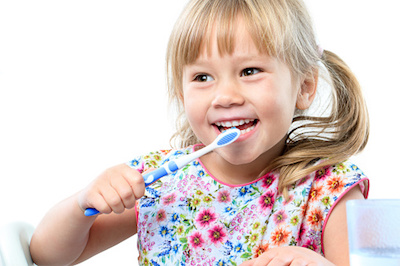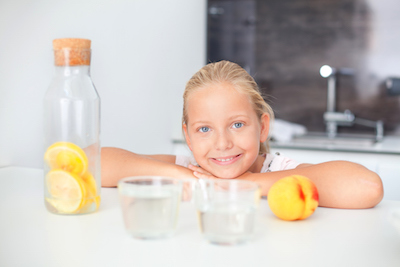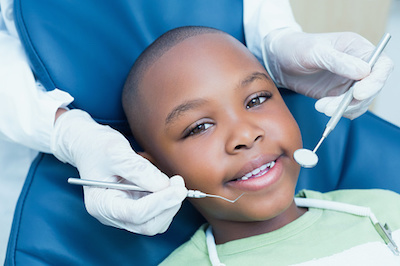5 easy things you can do to give your kids healthy teeth
So it’s happening. Your six-month-old baby is crying nonstop, and you finally found the reason: they have their first tooth! But what now? Everyone knows we’re supposed to brush our teeth. But when do you start teaching your child to brush? How often should your kids brush? What happens when they don’t take care of their teeth?
Here is some important information you can use to help keep your kids’ teeth healthy, whether it’s the first baby tooth or the last permanent molar.
What are cavities?
The reason we all hear about brushing our teeth regularly is to prevent cavities. Cavities, also called dental caries or tooth decay, are caused by bacteria in the mouth. Bacteria such as Streptococcus mutans grow easily inside the mouth, eating the sugar from our food and turning it into acid which dissolves the protective coating on our teeth. Cavities are costly to fix and can have serious consequences. If left untreated, tooth decay can lead to bad breath, mouth pain, and dental abscesses. Sometimes teeth need to be removed. It’s important to help your kids establish good habits early to prevent the need for a lot of expensive and invasive dental work later in life.
How do I prevent cavities?
Luckily, there are many ways to help prevent cavities, starting with activities and practices you can do at home.
1.Brushing
 Dental care starts at home with a proper tooth-brushing routine. From the time the first tooth breaks through, parents should start brushing their kids’ teeth at least twice per day. When they’re very young, you will need to do the brushing for them. At the toddler stage, kids should start brushing their teeth on their own first, followed by a parent who can re-do the brushing properly. For infants, only a smear of toothpaste should be used to prevent swallowing too much toothpaste. For older kids (ages three and up) who know how to spit, a glob the size of a pea can be used.
Dental care starts at home with a proper tooth-brushing routine. From the time the first tooth breaks through, parents should start brushing their kids’ teeth at least twice per day. When they’re very young, you will need to do the brushing for them. At the toddler stage, kids should start brushing their teeth on their own first, followed by a parent who can re-do the brushing properly. For infants, only a smear of toothpaste should be used to prevent swallowing too much toothpaste. For older kids (ages three and up) who know how to spit, a glob the size of a pea can be used.
2. Fluoride
Fluoride has been shown to strengthen tooth enamel, which is a hard substance that covers and protects the outside of the teeth. Stronger enamel keeps teeth strong and makes it more difficult for bacteria to cause tooth decay. One of the most important sources of fluoride is your tap water. In many areas, fluoride is added to tap water specifically to provide a little extra help in keeping your teeth healthy. If you live in an area where there is no fluoride in your water, don’t worry! You can use fluoridated toothpaste to brush your children’s teeth. Just remember to stick to the same rules as above: only a smear of toothpaste for small children, and a pea-sized amount after age three. In addition, your pediatrician will apply a fluoride varnish to your child’s teeth every three to six months to give some extra protection.
3. Limiting juice
 Kids love juice. It’s delicious, better than soda, and contains vitamins that your child needs to stay healthy. But, it’s so tasty because it’s packed full of sugar! Juice is also acidic, so when kids drink juice, the acids and sugars sit on the teeth and become the perfect place for bacteria to grow. Bacteria make more acid, which breaks down the tough enamel coating and leads to cavities. Current recommendations state that kids older than 6 months of age (but preferably after 1 year old) should get no more than 4-6 ounces of juice per day. Any juice given should be 100% juice; anything else usually contains added sugars on top of the sugar already found in fruit juice. Juice is best given with a regular or sippy cup, all at one time, and with a meal. This decreases the amount of time juice sits in the mouth by itself.
Kids love juice. It’s delicious, better than soda, and contains vitamins that your child needs to stay healthy. But, it’s so tasty because it’s packed full of sugar! Juice is also acidic, so when kids drink juice, the acids and sugars sit on the teeth and become the perfect place for bacteria to grow. Bacteria make more acid, which breaks down the tough enamel coating and leads to cavities. Current recommendations state that kids older than 6 months of age (but preferably after 1 year old) should get no more than 4-6 ounces of juice per day. Any juice given should be 100% juice; anything else usually contains added sugars on top of the sugar already found in fruit juice. Juice is best given with a regular or sippy cup, all at one time, and with a meal. This decreases the amount of time juice sits in the mouth by itself.
4. No bottles
Of course bottles are perfectly fine for infants to use. However, bottles can actually do more harm than good in the toddler stage. Children who are walking around tend to carry their bottles and sip slowly on whatever is inside, which leaves a coating of milk or juice (i.e. sugar) on the teeth all day. Likewise, children should not be allowed to go to bed with a bottle because leaving sugars in the mouth during sleep allows bacteria to thrive and increases the risk of cavities. Kids should be weaned off of bottles completely by 12 to 18 months of age. We know it might be hard to take the bottle away, but once they master the sippy cup, they won’t even remember the bottle.
5. No food sharing
While it is tempting to taste your baby’s food with his or her spoon to see how hot it is before giving it to them, don’t! If you must check, use a different spoon that your child won’t be putting in their mouth. Sharing utensils can transfer saliva with cavity-causing bacteria from your mouth to your baby’s mouth, making it easier for your child to get cavities later on. The same goes for pacifiers: always clean them with warm water, never with your mouth.
When should I take my child to the dentist?
 When your child first starts teething, going to the dentist is not usually the first thing you think of. Current recommendations from the American Academy of Pediatrics and the American Academy of Pediatric Dentistry state that all children should establish care with a pediatric dentist by 12 months of age. The dentist can help make a plan for how often your child should be re-evaluated. Getting regular check-ups at the dentist is one of the best ways to catch cavities early and stop them before they get worse.
When your child first starts teething, going to the dentist is not usually the first thing you think of. Current recommendations from the American Academy of Pediatrics and the American Academy of Pediatric Dentistry state that all children should establish care with a pediatric dentist by 12 months of age. The dentist can help make a plan for how often your child should be re-evaluated. Getting regular check-ups at the dentist is one of the best ways to catch cavities early and stop them before they get worse.






